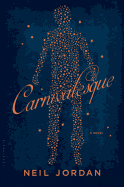
Known for writing and directing films such as The Crying Game, Neil Jordan (Night in Tunisia) demonstrates his vast literary imagination in Carnivalesque--a fantasia of the highest order that is marvelous, whimsical, dark and daring. The story, set in Ireland, focuses on a wayward adolescent boy named Andy, who, wandering into a carnival's hall of mirrors one night, is swept into an alternative world and replaced by a doppelgänger in the normal one. Entranced but homesick, Andy begins a long journey of self-discovery, navigating the emotionally fraught threshold between childhood and adulthood.
Jordan constructs a wonderfully intricate cosmology of carny existence, full of rich, fantastic imagery. More than fantasy, there's some magical realism at work in Carnivalesque, à la Gabriel García Márquez or Steven Millhauser. Jordan grounds his fantasy in painful elements of the human condition: "They saw something clearly, too clearly, by the mere fact of their existence. And this clarity was only made bearable by the evasions, the digressions, the fables they created to occlude it." Such self-conscious realism contrasts with moments of lavish poetic splendor in which Jordan gives his formidable powers of description free rein. Falling cherry blossoms, for instance, make "a diaphanous downward undulation that carpeted the dull mud-colored grass of the front lawns in a blaze of pink."
Carnivalesque possesses the moral weight of allegory. The ending arrives breathlessly, with surprising emotional intensity. And the journey there is, in a word, magical. --Scott Neuffer, freelance journalist, poet and fiction author

